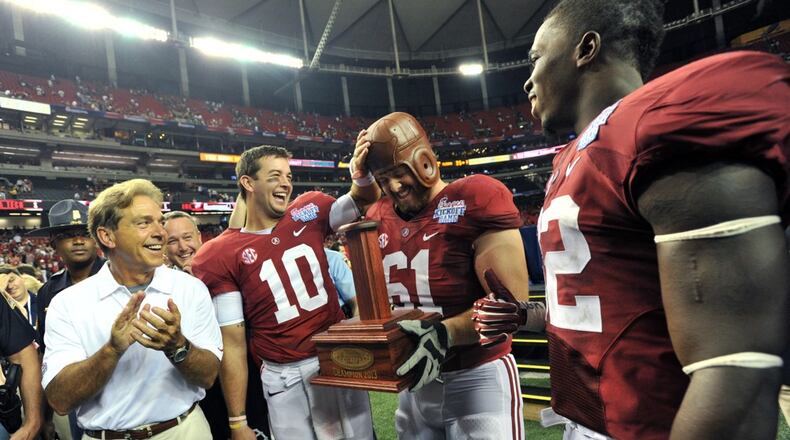The six national championships that Nick Saban won at Alabama were about his program-building as much as his coaching. The counter to the notion that the Crimson Tide will never find a coach as good as Saban after his retirement is that they don’t have to. Saban created the blueprint. His successor just needs to follow the instructions.
It’s plausible, even if it’s not that simple. The next coach will have Alabama’s brand and virtually unlimited resources. He may not have Saban’s skills as a football CEO. More than that, college football programs usually suffer long periods of relative decline after coaches who’ve won multiple national championships leave.
Alabama knows all about that. Bear Bryant won six national titles with the Crimson Tide from 1961-79. Alabama won one championship from 1980 until Saban began his historic run in 2009. Ohio State, Oklahoma, Nebraska and Ohio State suffered similar droughts after coaches who won multiple national titles left. They still won, just not as big or for as long as they used to.
It’s hard to win a college football national championship. Only 15 coaches have done it more than twice. Sustaining that rate of success is rare. Alabama was fortunate to have a chance to hire Saban in 2007, four seasons after he won a national championship at LSU.
Saban’s two-year stint with the NFL’s Dolphins ended with a 15-17 record and the realization that it was much harder to win when every opponent had at least as many good players. At Bama, Saban would stack his roster with talent while tapping into resources that only a handful of other programs could match. Saban leveraged that into recruiting the best players, hiring quality assistants and coaching them all up. The result was the greatest run of success in modern football history.
The Crimson Tide will have a hard time hiring a coach who’s won a national championship this time around. Only five active coaches have done so. That’s counting Jimbo Fisher, who was fired by Texas A&M in November. North Carolina coach Mack Brown won a national title at Texas. Three other championship coaches still are employed at the schools where they won: Kirby Smart, Dabo Swinney and Jim Harbaugh.
Smart won’t be going back to Bama after he built Georgia to become the main rival to his old boss’ program. Fisher hasn’t coached a championship team since Jameis Winston was his quarterback at Florida State. Brown, 72, left the TV booth to finish out the twilight of his career at North Carolina. Harbaugh will return to Michigan if he doesn’t go back to the NFL and, anyway, he would be an awkward fit at Alabama.
That leaves Clemson’s Swinney. There was a time when he was the unofficial heir apparent to Saban. It made sense. Swinney beat Saban twice for national championships. He was born in Birmingham and played and coached at Alabama. Once Saban left, then Swinney surely would return home, and the Crimson Tide wouldn’t miss a beat.
But Swinney’s luster has worn off. Clemson was routed by Ohio State in the College Football Playoff semifinal during the 2020 season and is 30-10 since then. A viral video posted to social media Wednesday night showed a small group of Alabama fans gathered on campus next to a statue of Saban chanting: “Anyone but Dabo!”
That may not represent the popular sentiment, and even if it does, it shouldn’t matter to Alabama’s decision-makers. They can’t scratch a proven coach off the list. It already will be hard enough to find a candidate who can even come close to replicating Saban’s success.
Long championship droughts are the norm for programs once multiple-title coaches are gone. Ohio State, Texas, Nebraska and Oklahoma have been chasing their glory years for a long time.
Oklahoma has been through two championship droughts after coaches who won multiple titles left. Bud Wilkinson won it all in 1950, ‘55 and ‘56. The next Sooners title came in 1974 with Barry Switzer. He won the last of three championships in 1988. Oklahoma has won a single championship since then, in 2000 with coach Bob Stoops.
Texas has yet to regain its dominance after legendary coach Darrell Royal stepped down. He won three championships from 1963-70. The Longhorns have won one title since then, in 2005.
Bob Devaney won back-to-back titles for Nebraska in 1970 and ‘71. The Cornhuskers wouldn’t win another one until coach Tom Osborne did it in 1994. He won it all again in 1995 and 1997. Nebraska is still seeking its next championship.
Hayes won five national championships as Ohio State coach from 1954-70. The Buckeyes wouldn’t win another national championship until 2002 with coach Jim Tressel. The Buckeyes, like Alabama, returned to the top by hiring a coach who won a championship elsewhere. Urban Meyer won the 2014 national for Ohio State after he’d done it twice with Tim Tebow at Florida.
OSU replaced Meyer with his offensive coordinator, Ryan Day. Not counting Day’s three games as interim coach during Meyer’s suspension, he’s 53-8 in five seasons as the Buckeyes’ coach, with CFP bids in three of those years. The Buckeyes finished third, second, sixth, fourth and 10th in the final AP poll during that time.
That’s a very good run for Day. It’s probably not good enough for Ohio State, especially since Day is 1-4 against archrival Michigan. Alabama fans wouldn’t be happy with their next coach if he produces results like Day. You can say they have unrealistic expectations, but then again, Saban left the program in great shape with the necessary infrastructure for the next coach.
But the chances are very low that Saban’s successor will win at the same level for so long. They can’t be expected to duplicate the best run of success in modern college football. Programs with lesser peaks couldn’t do it once their great coaches were gone. Alabama already knows all about that.
About the Author
The Latest
Featured


